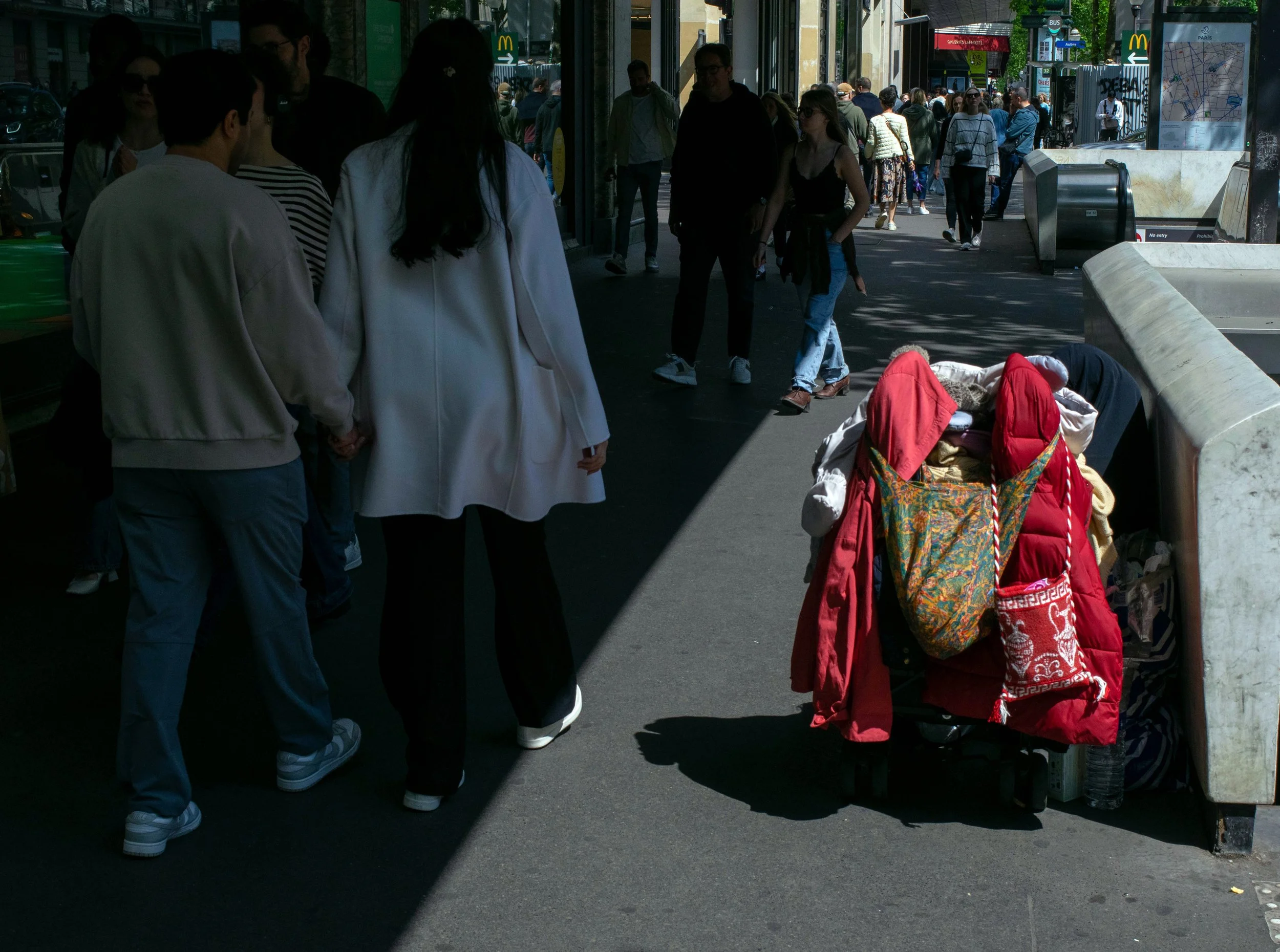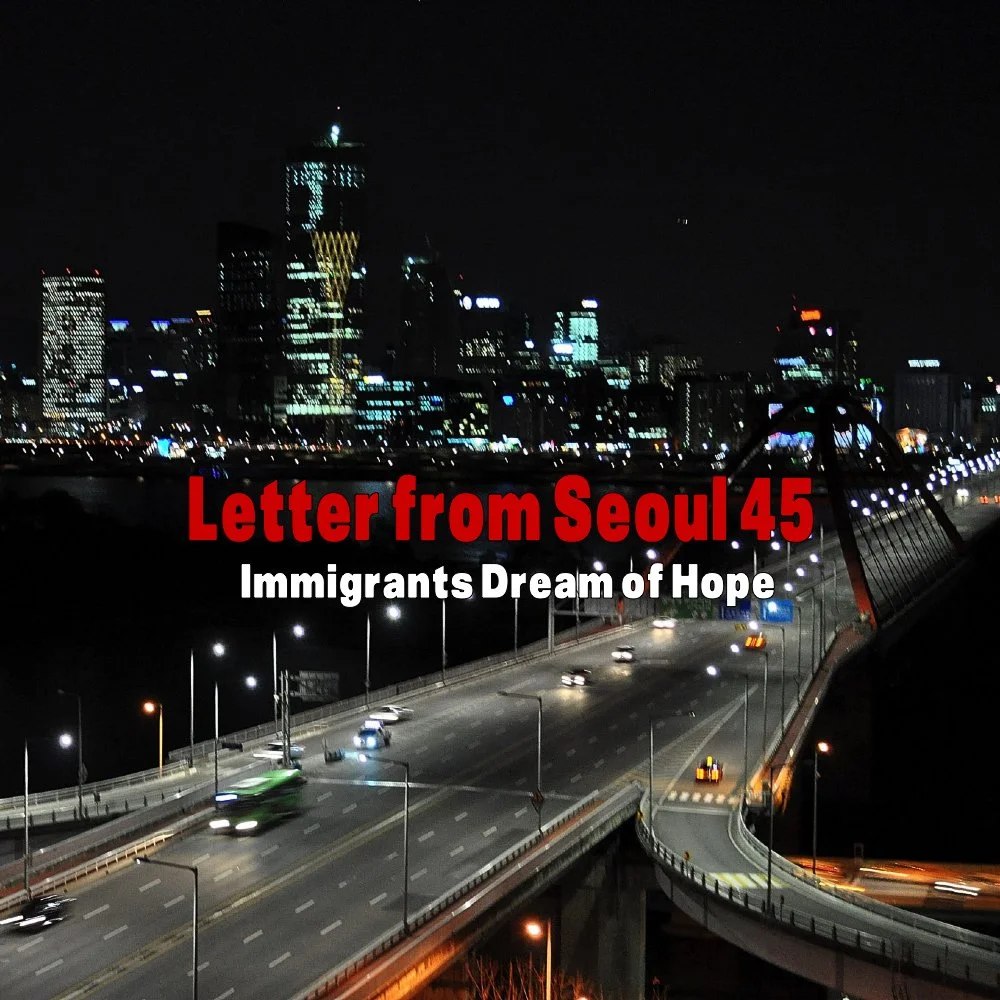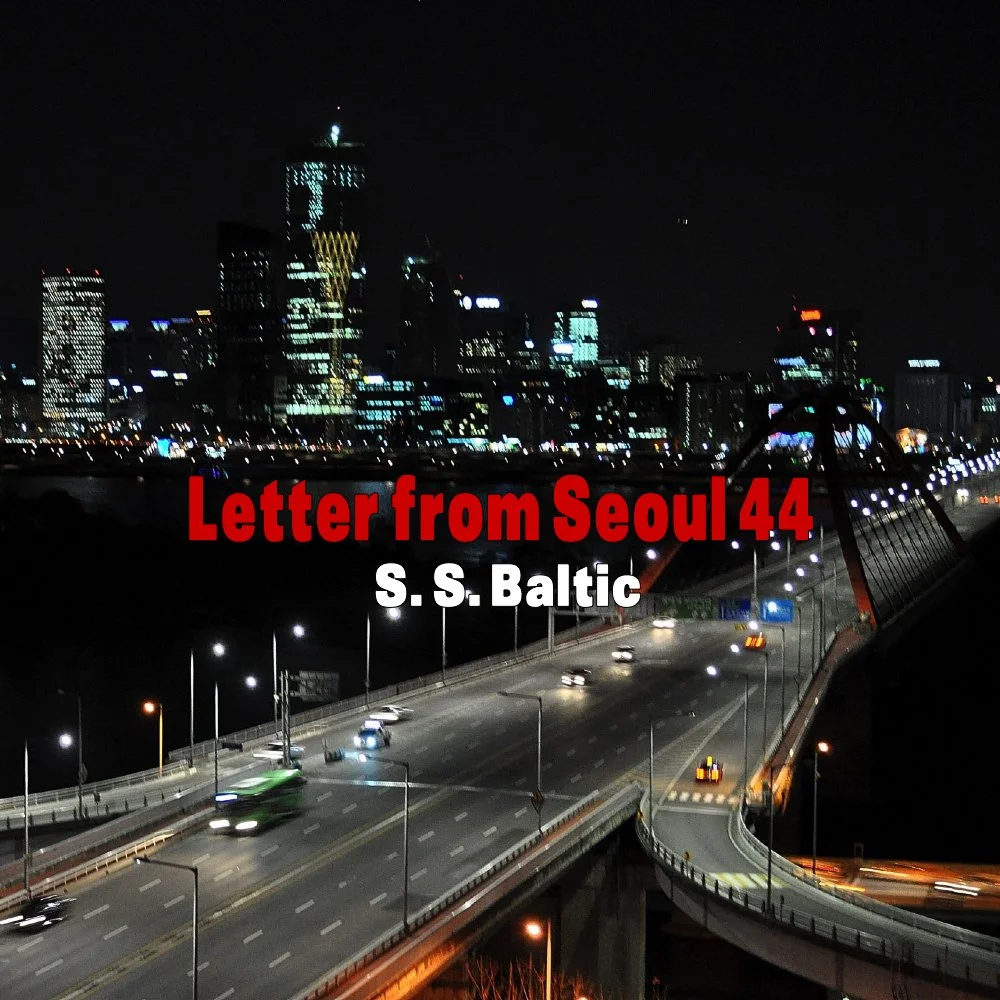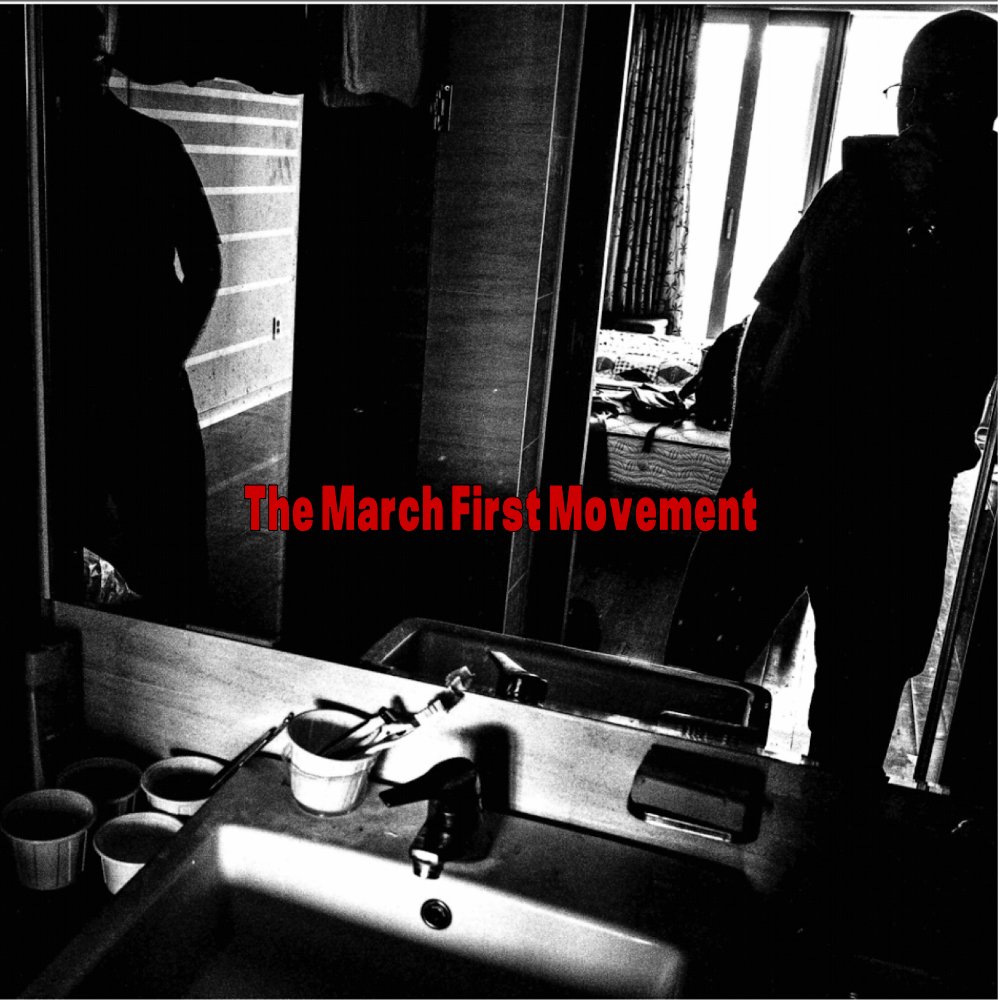Letter from Seoul - 9
Sookyung takes her last photo before heading home after a two-week vacation in London, Dublin and Paris.
Notes from The Road
Flew in from London Heathrow on KE908
Haven’t recovered from jet lag yet.
On the way in-flight movies played all-night
Man, it was a 14-hour trip.
I'm back in the Republic of Samsung
It’s good to be home
Back in this city called Seoul.
The idea of a recent vacation in Western Europe was a birthday gift to my wife for accompanying me through India four times. She dislikes the place, and has zero interest in traveling through Turd World countries. As opposites often attract, my wife is Korean and wants a Western culture travel experience. I’m an American interested in life beyond North America. To say I’m an expat is accurate. I’ve currently lived outside the U.S. for over 20-years.
A contradiction of our relationship is that my wife wants a glimpse of a multicultural world, yet can’t wait to return to the homogenous norms of Korea, where everyone appears to look alike and is part of the same extended family, sharing the same values.
The Orient intrigues me because I was never exposed to any of its culture, history, literature, architecture and politics when I came of age in St. Louis during the 1960s. And it took me until age 50 to start achieving the American Dream of upward mobility with a fair measure of prosperity – but I had to leave the country for that to happen.
The mythology of America involves the acceptance of diversity in race, heritage, and religion – with individual achievement prized at the expense of the group. In the hands of film director John Ford (1894-1973), the quintessential American male who personifies rugged American individualism is John Wayne (1907-1979). And the best of their collaborations is The Searchers (1956).
Despite the myth of American cultural diversity, there is also a conformity – perhaps most evident in the dominance of the English language and the imprint of Christianity as expressed in Cathedrals and churches across the land. Jewish temples, here and there – mostly in the big cities. Muslim mosques, not so much. Buddhist temples; maybe Southern California. Hindu temples; what do you mean?
Today, in America, our Silicon Valley wunderkinds propel us kicking and screaming into the brave new world of Artificial Intelligence and more and more disinformation, as our Fascist Republican politicians drag us, also kicking and screaming, back to the shameful, brutal past.
Irish Nobel Prize winning author Samuel Beckett (1906-1989) said: “You’re on Earth. There is no cure for that.”
“Existential, my dear Watson.”
My wife and I are both in our early 70s and confirmed coffin-dodgers. We have things to do, so death can wait.
We are The Searchers.
* * *
Our journey to London began with a 14-hour non-stop flight from Seoul. Nearly every seat was occupied by other Koreans interested in seeing how the other half lives – the weakness of the Korean won against the British pound sterling be damned.
When I lived briefly in the market town of Huntingdon in Cambridgeshire 20-years-ago, England was turning a bit darker. However, I was always mistaken as a natural born son, as long as my American version of the English language remained silent.
Yet things have changed noticeably with an influx of immigrants from the British Commonwealth.
The United Kingdom – always referenced from across the Atlantic Ocean as “England,” has had its share of immigrants: the Celts, the Romans, the Anglo-Saxons, the Vikings, and the Normans (descendants of the Vikings living in France). Actually, the word “invaders” is more apropos for these groups.
During the summer of 2005, I lived outside Wurzburg and had to submit paperwork to a U.K. office in Dusseldorf for a work visa in Old Blighty – the next destination in my odyssey. The place was jammed with Commonwealth folks – mostly from India, Pakistan, some African countries and a few from Hong Kong. It was in that brief moment that I realized the U.K. perhaps deserved its own Statue of Liberty in the middle of the Thames across from Parliament, instead of the nearby peculiar London Eye.
It’s easy to forget that the Commonwealth comprises 56 countries, all former colonies from the British Empire days. The total population of the Commonwealth is 2.4 billion – with India-Pakistan having the lion’s share at 1.6 billion.
Travel mode
We prefer to travel independently; no tour group with mandatory stops at some sweatshop of underpaid women making scarves or fake jewelry – with the husbands along for the tour off to the side like bored fish in an aquarium.
To pull this off, one must coordinate flight arrangements – and keep track of visa requirements to include length of stay and potential entry-and-exit fees, especially as an international couple.
For instance:
Before I acquired Permanent Residency status in Korea (which is to say South Korea), I could stay in the country for 90-day as a tourist at no cost.
My wife – and all Koreans who wish to visit the U.S. as tourists, must maintain a valid Electronic System for Travel Authorization (ESTA) pass that is good for two-years. This applies to all citizens of Visa Waiver Program (VWP) countries - and there are 41 nations that participate in this U.S. Homeland Security policy. Technically, a tourist visa for the U.S. is free – yet technically one must pay to maintain the ESTA status.
A basic tourist visa to China costs U.S. citizens $140, with another $30 for “special fees.”
For Koreans, a tourist visa for the next-door neighbor costs about 55,000 won, or $40.
Korea and China have reached an agreement that members of officially organized tours may enter the neighboring countries for free.
Chinese tourists who visit Korea (which is to say Seoul) without a tour sponsor must pay about 22,000 won, or $15. For years a small army of young Chinese tourists – primarily females, start arriving every Thursday armed with credit cards and small carry-on suitcases. They usually stay at the three-star hotels near the Myeong-dong and Namdaemun market areas in the center of downtown Seoul.
By late Sunday afternoon, these young Chinese tourists are back at the Incheon International Airport outside of the city for flights back to Beijing or Shanghai – which are no more than 2.5 hours by airplane.
Most of these Chinese tourists are often buying Made in China products, which are cheaper outside of their own country.
For a tourist visa to any of the 27-member EU bloc countries, there is no fee for Americans and Koreans. The same applies to the United Kingdom.
As for the security check game at international airports, every departure is different: shoes on ... shoes off; belt on ... belt off; cameras in the tray – cameras don’t matter; food allowed – food confiscated.
One must remain calm, and learn to endure.
Transportation
Several years ago, most brand name hotels (to name only a few): Hilton, Hyatt, and Marriott provided shuttle service to-and-from the airport and hotel. This has gone by the wayside and third parties have stepped into place.
After a 14-hour flight with some standard luggage (and women always pack more than men), do you really want to put yourself in the hands of a taxi driver from Somalia who feigns a lack of English, jacks the meter-up by zig-zagging an extra 20-miles for a trip that only requires half the length – and never seems to have change for some large paper currency and yet always says in very distinct English: “Got no change, boss.”
If you enjoy masochism, this may be appealing. For normal people, this is no way to travel. And, if you’re a gray panther getting your kicks spending some modest money to live large for two weeks, this is not advisable.
Turn to a third party like Kayak, Trip Advisor, Viator – some independent shuttle services and pay a flat rate.
It’s tempting to ask the hotel to make these arrangements, but this is not wise – and most won’t do this because they don’t want to deal with flakey companies that dispatch the newest immigrant driver who is already tweaking from some meth by 8 a.m. – or gets pulled out of his car at a Paris stoplight and stomped by some Algerian riff-raff.
Lastly, keep in mind the difference in electric voltage in whatever country is part of the travel plan. Most countries are 220-voltage, with the U.S. maintaining the odd 110-system. Of course, the British have the 230-voltage system, which is what the Irish Republic uses – despite shooting its way out of the United Kingdom during 1919-1921. For that matter, many of the Commonwealth countries stick with the 230-voltage system. Australia is a different matter, but that’s no surprise.
Always be prepared with an adapter or two. It’s part of the adventure.
Start the day right
As there is no free lunch in life, there is no complimentary breakfast at hotels. The bill is padded to reflect this service, or you can pay around $30 per person for yesterday’s re-heated leftovers.
Since America has conquered the world with overpriced processed food at McDonald’s, there’s nearly a franchise every two blocks in a major city. This might actually strengthen your immunity system against the next pandemic from a Chinese lab – because what virus would want to feed off a body exposed to years of McDonald’s trash food? I rest my case.
Let’s not forget a robust cup of overpriced coffee from Starbucks, also dotting the First World urban landscape as much as McDonald’s. How many people understand the significance of this franchise name? Starbuck is the scrupulous and steadfast first mate of the Pequod in Moby Dick (1851) by Herman Melville (1819-1891).
If you are married to a Korean woman, her luggage is usually filled with little tubs of packaged rice, some kim (seaweed) and ramen noodles, a Japanese dish of Chinese origin. This is all from the Orient, and it’s all good. And let’s not forget a small electric pot to steam everything.
Somehow this fits into a standard suitcase with no problems.
To minimize any generalities, other tour guides on past vacations have told me: “Korean women do this all the time when they travel abroad.”
Put Your Cards on the Table
An old adage: of all the books in the world, the best stories are found between the pages of a passport.
Yet to make international traveling easier, a good credit card is necessary. And for starters, a credit card that does not charge for foreign currency transactions.
With some minor fluctuations, the U.S. dollar is currently worth:
- 92-cents against the Euro;
- 79-cents against the British pound.
The Korean won - with 1,000 as a benchmark like 100-cents or pence in Western currencies, is approximately worth:
- 730-won against the U.S. dollar;
- 670-won against the Euro;
- 570-won against the British pound.
Just drop the last zero in the won examples for an easier reference point.
No one enjoys visiting a foreign country knowing your currency is weak. Twenty-years ago when I lived outside London, the U.S. dollar was only worth 50-cents against the British pound.
And the U.S. still has Air Force bases in both Lakenheath and Alconbury, leftover from the World War II bombing raids over Germany. The bases are fully operational, updated to the highest standards – to include the DoDEA overseas school system for American dependents.
Yet the dollar is still weak against the pound sterling.
For our lifestyle as an international couple, it’s best to work from the U.S. dollar, and leave the won at home.
However, a credit card that does not charge foreign currency transaction fees is the way to travel.
One could easily fall down the rabbit-hole in search for the ideal card, since major American banks offer countless choices. In the U.S. Chase Bank leads the way, with Citibank, Wells Fargo, Bank of America and AmericanExpress close behind.
Clearly, other countries have banking systems with similar business models, though both Visa and Mastercard are fully global.
I use a specific American credit card. I’m not interested in product endorsements, whether it be credit cards, airlines, hotels or cameras. This arrangement just works well for my lifestyle.
Since relocating to Seoul in 2010, I can’t remember the last time I went to a money exchange to switch dollars-to-won. I use my credit card and the vendor gets paid in won, and my card charges me the dollar rate. I don’t worry about the exchange rate; the convenience is a huge relief.
There are four Costco Stores in Seoul, and we go to the one closest to our neighborhood, buy what’s necessary and my credit card bills me the going dollar rate without any transaction fees. There is a modest annual fee to the card, but no big deal – plus there’s that world of credit card points much like frequent flyer miles.
From LA-based travel writer Chris Yong of The Washington Post: “If you binge-watch videos on your cell phone or iPad for long enough, you’re likely to run into at least one clip about travel ‘hacking.’ Discover ways to fly free, one video might say. Crisscross the globe and stay at hotels without paying a dime, another may declare. These TikTok and Instagram posts are popular for a reason. Leveraging loyalty-and-rewards programs from airlines, hotels and credit cards has helped travelers save for decades; American Express and American Airlines were some of the first players in the 1980s. Complex rules have made the universe of points and miles seem inaccessible to people outside the world of frequent business travel, but that audience is expanding as barriers to entry are lowered. Today there are hundreds of blogs and social media accounts dedicated entirely to breaking down the nuances of points and miles. However, you can’t trust them all.”
During our recent stay in London, we did the hop-on hop-off bus approach to see the city sights – and took care of all the tickets before leaving Seoul. Yet there was a day we set aside so my wife could make the pilgrimage to the Costco store near Wembley Stadium. I can’t explain these things; it’s just the way it is for her. She really needs a Costco passport, since we’ve been to stores in Seattle, Vancouver and now London.
To reach Wembley Stadium station, we had to take the London subway, better known as The Tube.
At first, it seemed best to get a one-day pass ... until I realized that in London, one can use a major credit card as a “swipe card,” or “pay-as-you-go” card. No one had wised me up to this option, which beat dropping about $18 each for a day pass on the subway. Luckily, I had a back-up credit card with me, so we both had a much cheaper access to The Tube.
So far, a credit card as a “swipe card” for the tran in Dublin and the subway in Paris is not yet an option. But this is only a matter of time.
Location, location, location
Ideally, a hotel near the city center – or a decent subway system makes for an enjoyable vacation when traveling independently. Tour companies, whether it’s Cosmos in London or Lotte Tours in Seoul, usually book group tours in three-star hotels and double book the room. This is the normal business model for all major tour groups. It does not matter if a married couple is sharing the same room – as one would expect; the price of the tour is the same per person, which means the couple is paying twice the price for a room.
Each night, it’s a new location – and then ... back on the bus.
Yet if traveling independently, either as a single adventurer or as a couple, the hotel is usually a four-star accommodation for a stay of four or five days. This offers a more relaxed pace and the ability to scope out the neighborhood. If all is well and good, it makes sense to return to the same hotel a few years later or so because you already have your settings established.
For London, we stayed about a 20-minute walk to Kings Cross subway station. The location was perfect.
Ireland by rail
- Late afternoon cross-country return from Galway-to-Dublin.
In Dublin, we stayed at a hotel about four blocks north of the River Liffey, and perhaps a 20-minute walk to O’Connell Street – considered the heart of the city.
For the uninitiated, Daniel O’Connor (1775-1847) is regarded by the Irish as The Liberator – the acknowledged leader of the Catholic majority. Following the defeat of British King James II at the Battle of the Boyne in 1690, the history of Irish Catholics changed from bad-to-worse.
James II was the last of the Stuart dynasty – which starts with Mary, Queen of Scots – who was beheaded on orders of her Tudor cousin, Elizabeth I.
Mary Stuart never ruled England, yet ironically her son – known to history as James I, ascended to the throne since Elizabeth Tudor, the Virgin Queen (hence, the American colony of Virginia) had no children, and her siblings had already died.
James I (the King James version of The Bible) maintained the status quo of the Anglican Church as distinct and separate from Rome - also known as The Elizabethan Settlement, which put an end to the bloodshed and turmoil over Christianity that racked England in the mid-to-late 1500s.
Yet James II, with the backing of Louis XIV – the Sun King, intended to restore Catholicism in England. Following his defeat at the Battle of the Boyne in Ireland during 1690 – the Catholic Church was outlawed in Ireland under the Penal Laws of 1695.
As a result, Irish Catholics had no rights whatsoever. They could not own property, could not vote, could not attend school – and all evidence of an Irish Catholic’s existence was forbidden; no civil records from a national census, and certainly no sacramental records. Anyone caught administering the Catholic sacraments – with seminaries in both France and Spain providing training for renegade Irish priests – were beheaded by the British.
Daniel O’Connell is revered in Ireland for the Catholic Emancipation Act of 1829 - which restored these fundamental rights.
* * *
Galeries Lafayette, near the Opera House
By the time we reached Paris on this vacation, we stayed at a hotel we first experienced in 2015, during our last visit to The City of Night. This made sense because we knew the neighborhood – and the hotel is a fairly classy four-star affair. The hotel is two blocks from Rue Haussmann. The wide tree-lined boulevard was created by Napoleon III (1808-1873), under the direction of his Prefect of the Seine, Baron Haussmann (1809-1891).
Rue Haussmann leads directly to the Galeries Lafayette and the Opera House, a good 20-minute walk from the hotel.
One afternoon we meandered beyond the Opera House area and walked leisurely to The Church of Sainte-Marie-Madeleine, better known as La Madeleine, then a few blocks more to Place de la Concorde, home of the French Assembly, and then a few blocks more to the Champs-Élysées.
And then we re-traced our path for the walk back to the hotel. Not too bad for two gray panthers.
Naturally, we took our time. Being retired means never having to answer to anyone. And traveling independently means you can stop off at Monoprix, a leading grocery store in Paris for some last-minute items, or get a table at Café Indiana for a genuine American cheeseburger – instead of that overpriced slop served at McDonald’s.
As this is 2024, Henry Miller was penniless when he hit Paris in 1930 ... almost a century ago. How could I not think of him every time I walked the streets of Paris? Miller changed my world forever when I read Tropic of Cancer, as a precocious 16-year-old. Because of Miller, I’m an inveterate writer of letters – a correspondent of the road. An American expatriate.
Have passports, will travel.
〰️
Have passports, will travel. 〰️
London
Sookyung in London



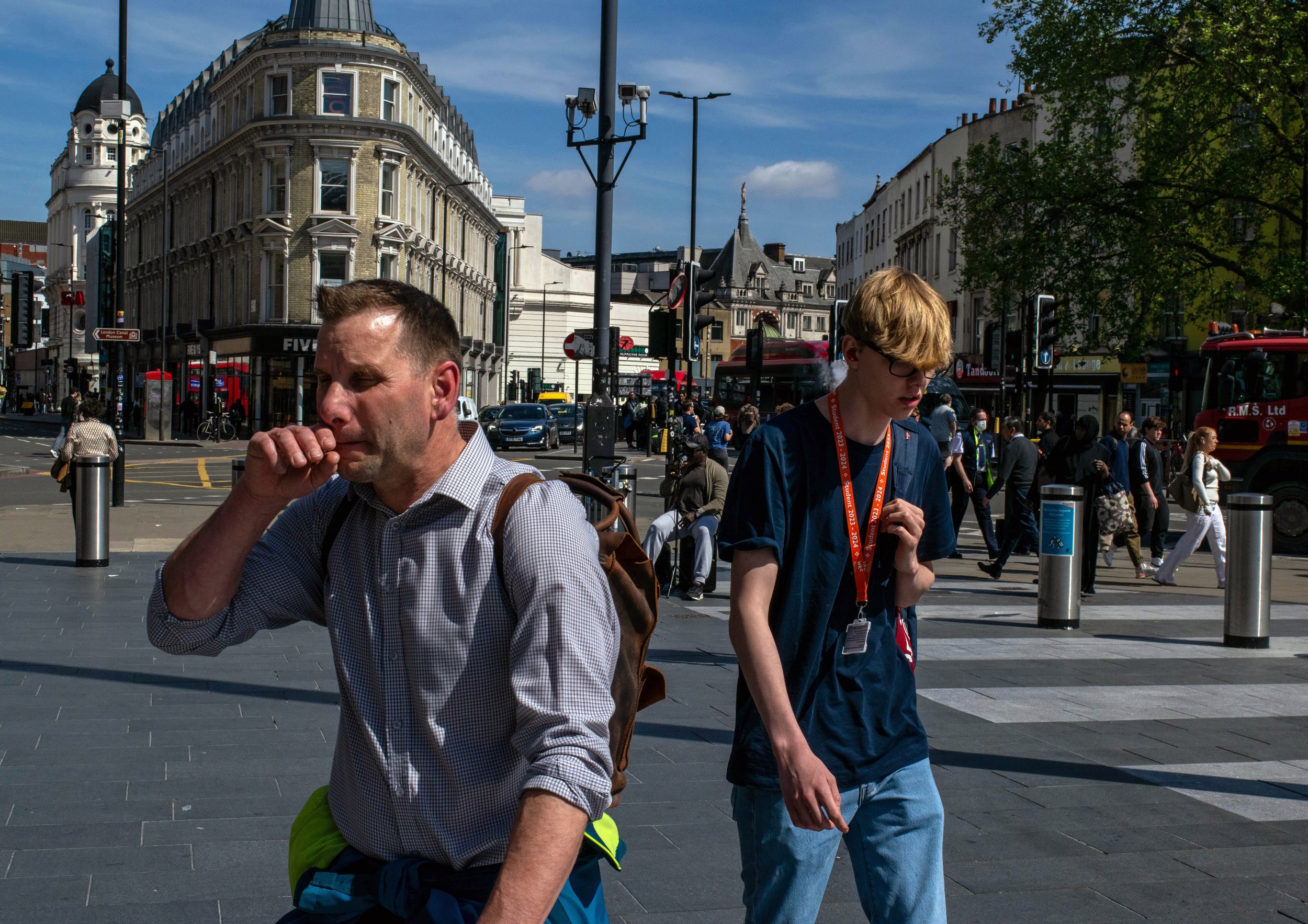
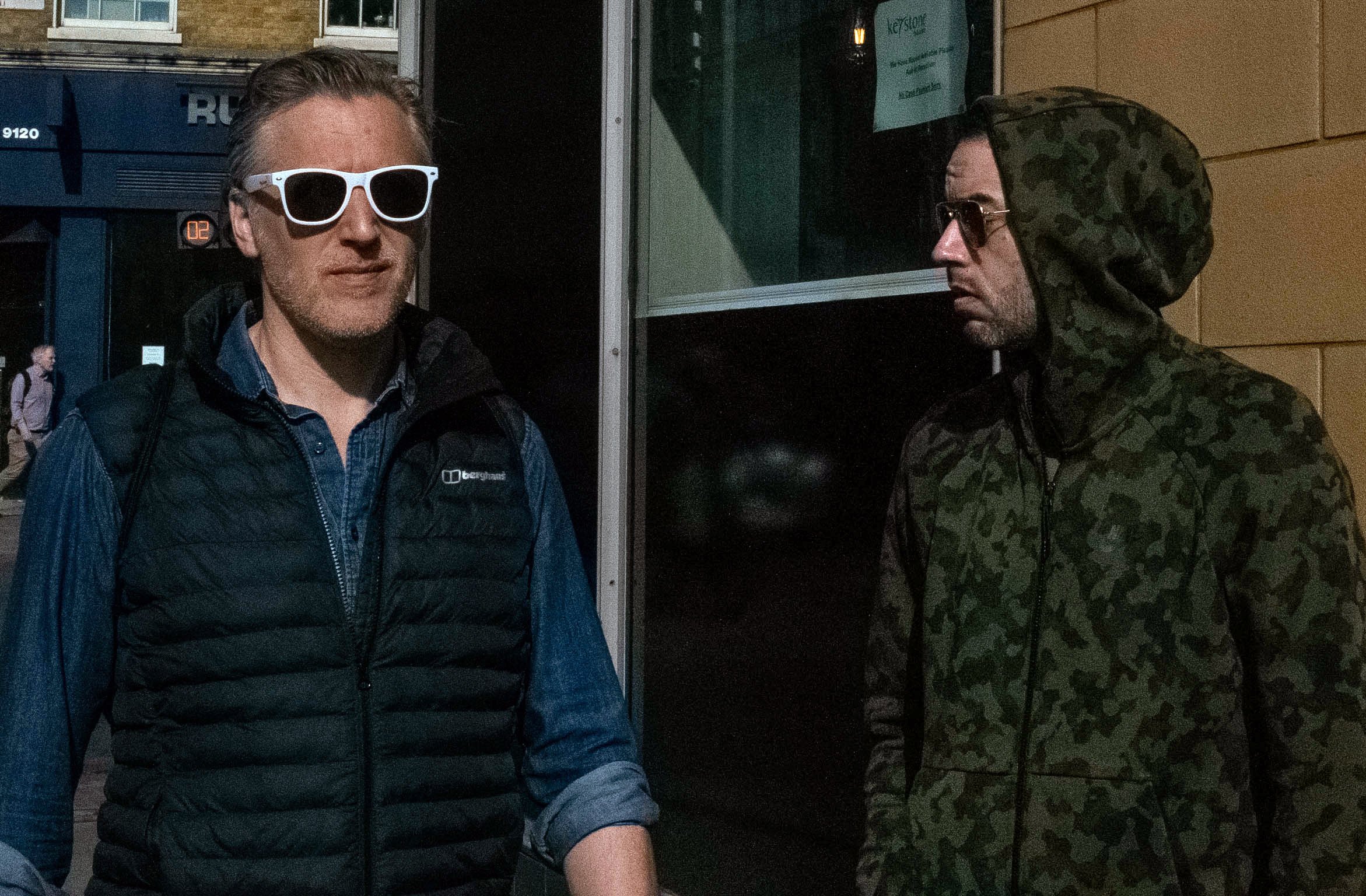
Dublin
Sookyung in Dublin
Galway
Paris
Sookyung in Paris




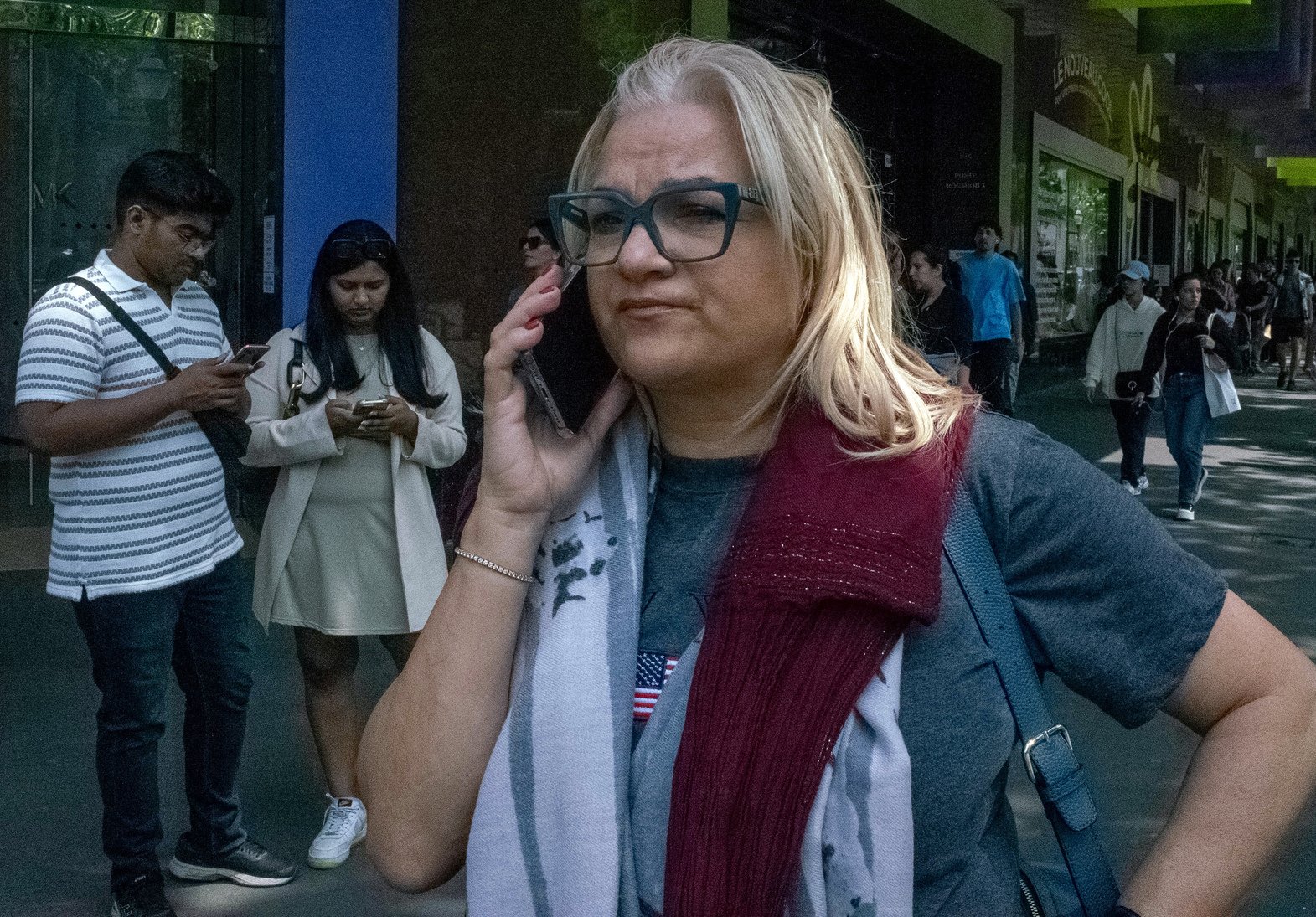

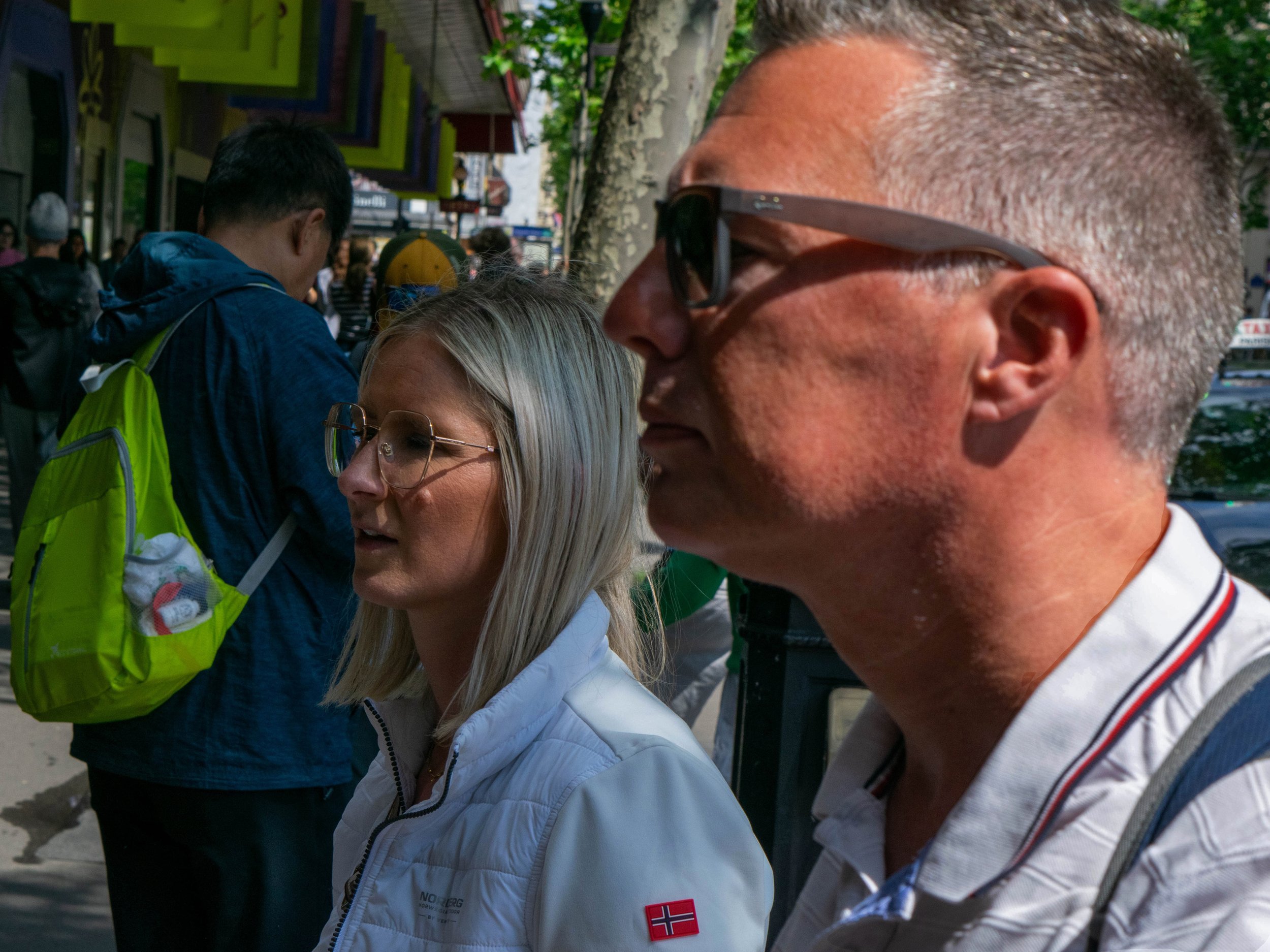
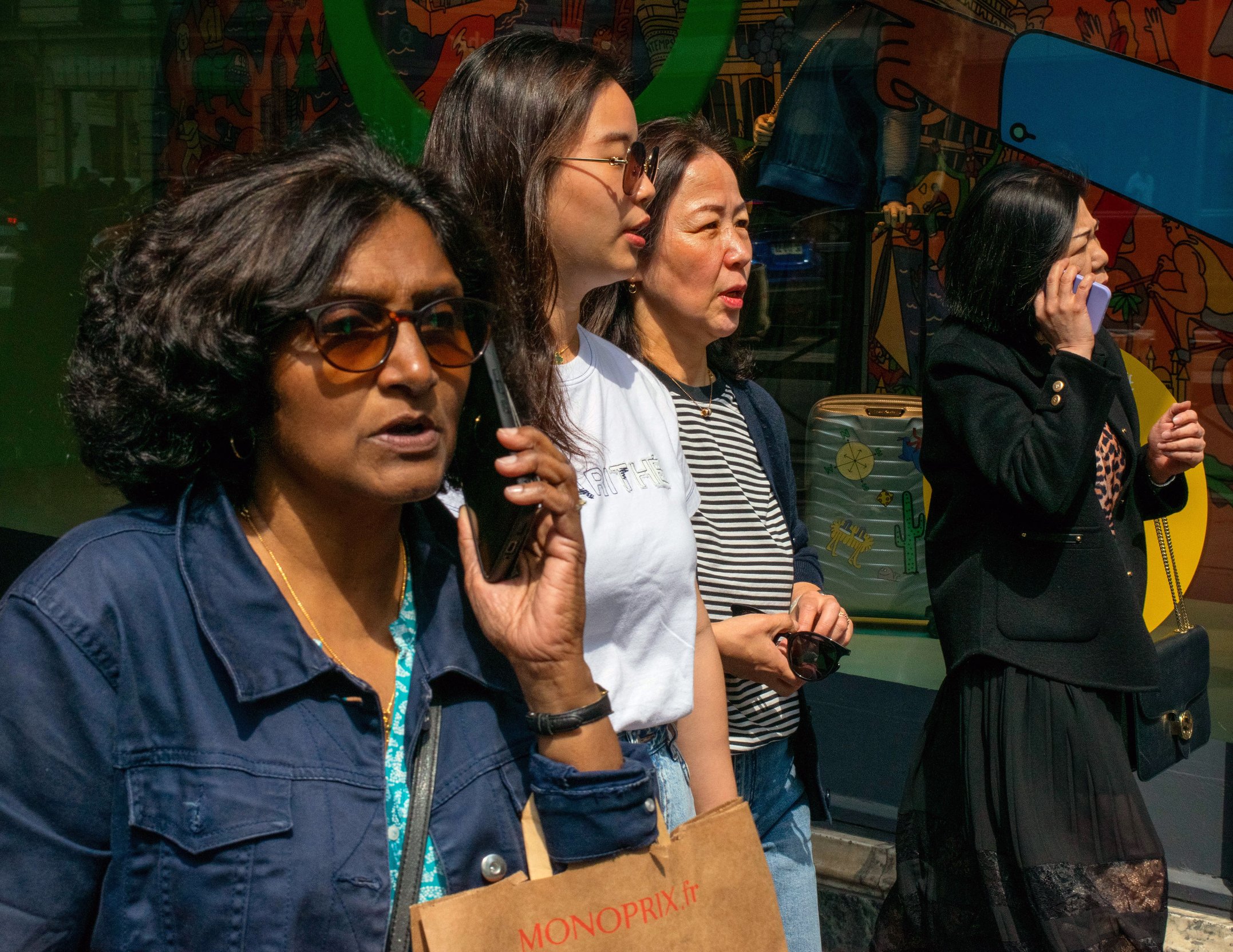



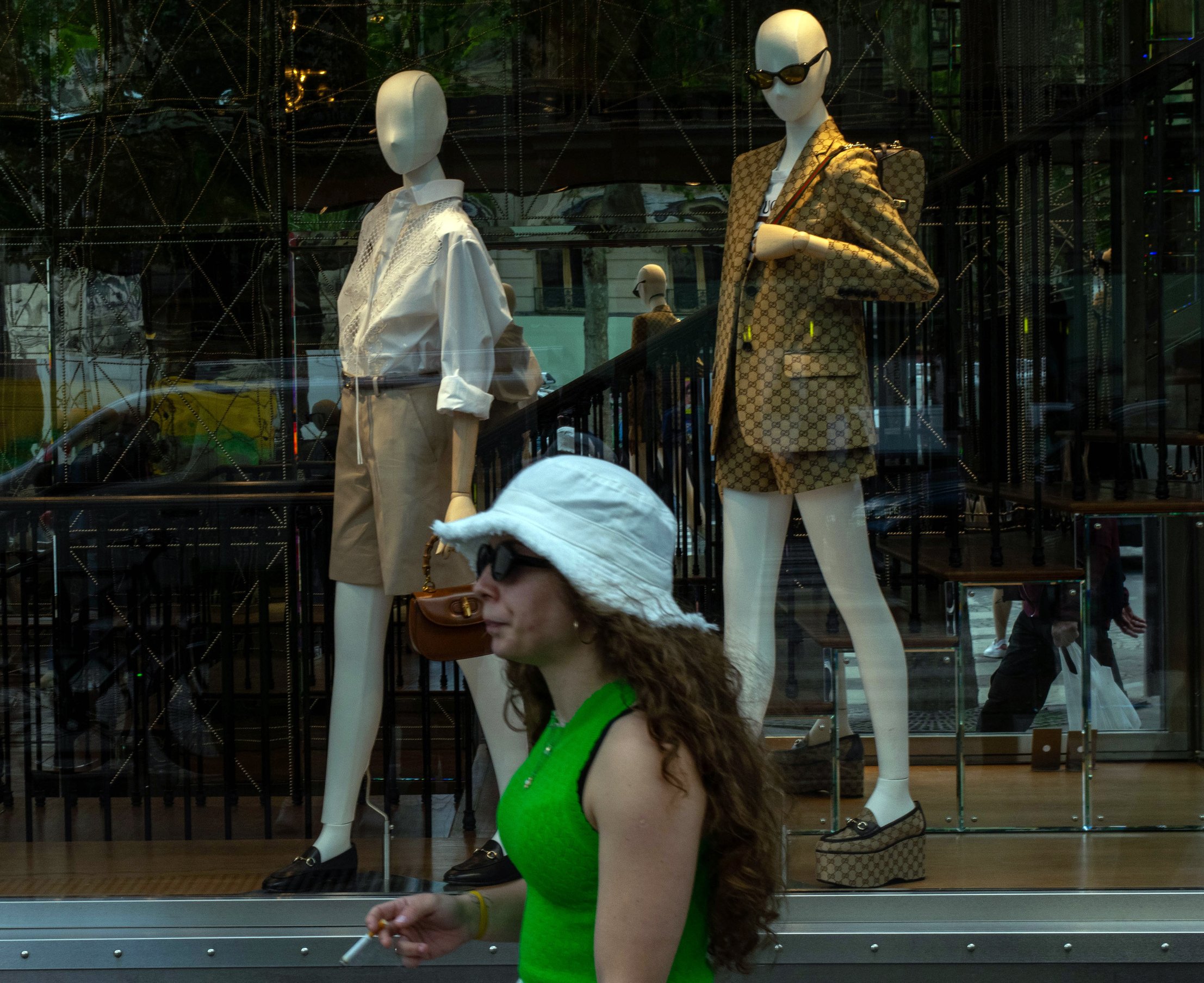




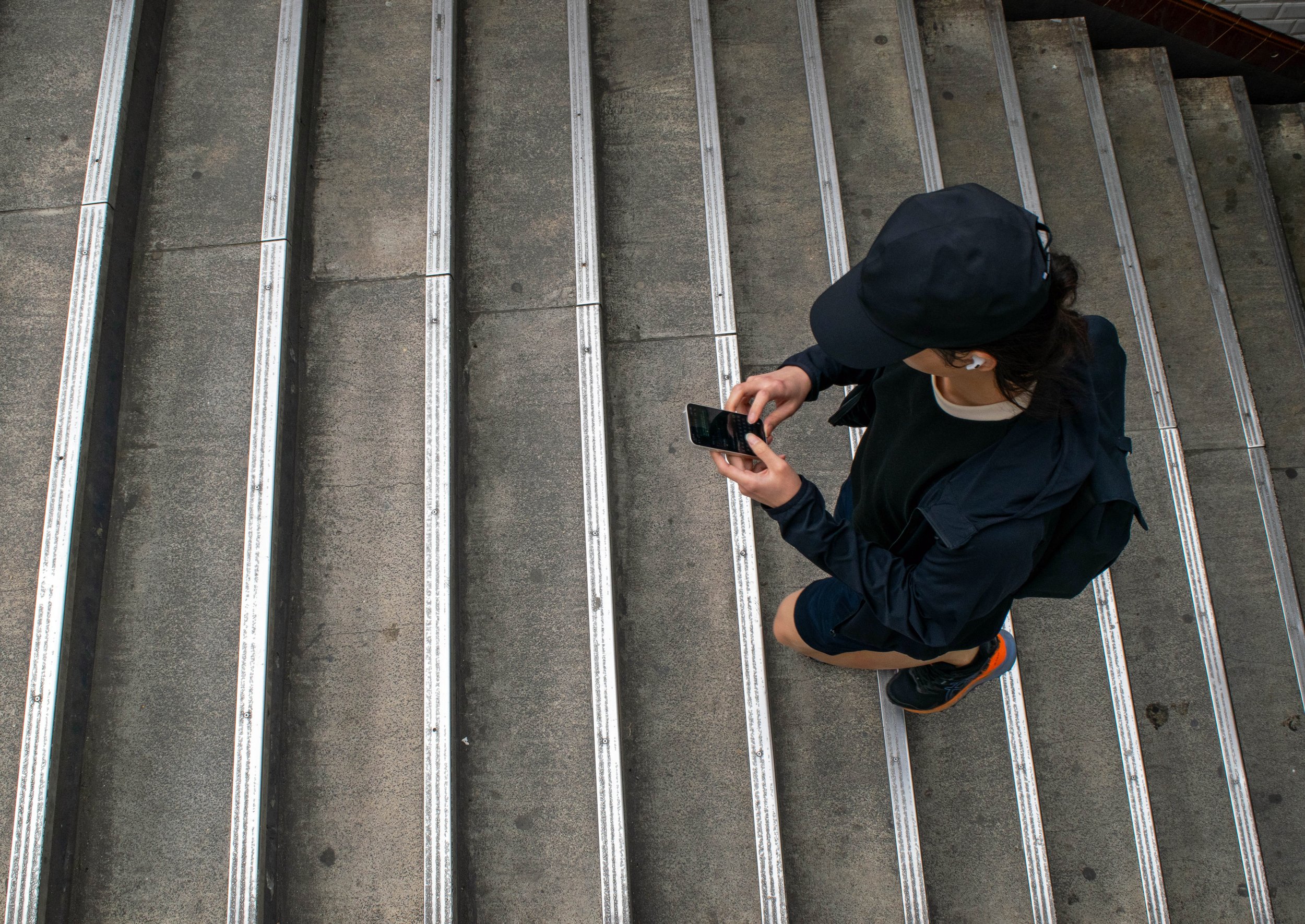
In that bygone era of grade school, when a collection of students was together in the same room with the same teacher for an academic year, my sixth-grade teacher bought us all a smart looking paperback copy of Roget’s Thesaurus. If he had handed me a bag of gold, it would not have been as valuable as that 50-cent thesaurus. It changed my life.
For high school graduation, my mother presented me with a portable manual typewriter and a hardbound copy of Roget’s Thesaurus. I’ve had a half-century relationship with that edition – longer than my connection with any one person, and it has accompanied me from St. Louis-to-Seoul, and all points in between. That edition from 1970 remains an integral part of my book collection.
Allegedly, Christopher Hitchens (1949-2011), an immensely talented wit and writer, could imbibe liberal quantities of alcoholic refreshments throughout the day, hold forth with ease and intellectual dexterity on literary, political and religious issues at both formal lectures and lively parties - then sit before a keyboard at 1 a.m. and produce a stunning essay for Vanity Fair that marked him as the rightful heir to Gore Vidal in his prime.
I’m still waiting for lightning to strike, to know what I want to be when I grow up, to be enraptured by a muse who will inspire me as much as June Mansfield (1902-1979) shaped the life of Henry Miller (1891-1980), her husband, who went unaccompanied to Paris in 1930 and during this down-and-out period wrote countless letters to his wife and friends in New York City that became the material for the scandalous Tropic of Cancer – banned as obscene for 30-years, edited by his mistress and benefactor, Anais Nin (1903-1977). Perhaps the best we can do is to be an interesting collection of contradictions.
Call me Kennedy. Ahab had his whale. William Burroughs (1914-1997) had his heroin. Bruce Chatwin (1940-1989) had his Patagonia. As for me, I have a camera and a passport.
The play’s the thing.
Michael Kennedy


















































